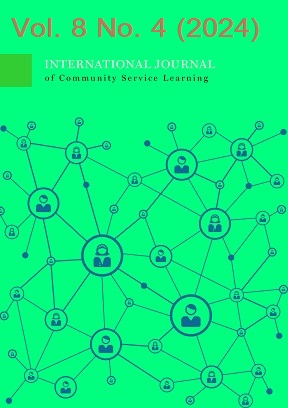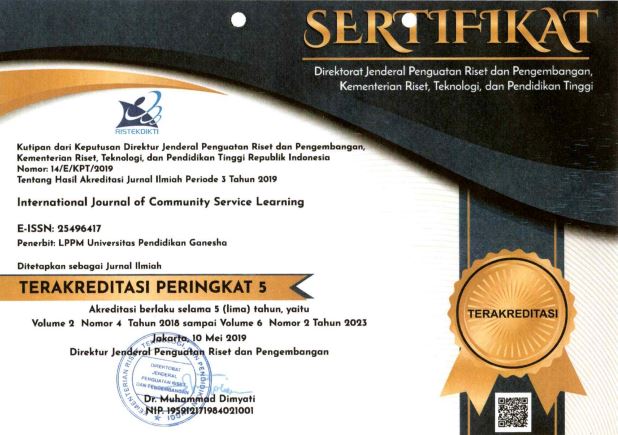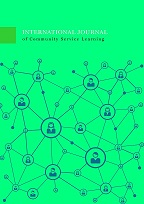Empowering Villages through Waste Management for Agritourism Success
DOI:
https://doi.org/10.23887/ijcsl.v8i4.85336Keywords:
Waste Management, Agritourism, Rural tourismAbstract
A very crucial issue that needs serious attention for tourism development in rural areas is waste management. Thus, anticipation and solutions to problems, including the environmental impact, are needed in developing villages as agritourism areas. The purpose of this research is to identify programs required by the community to promote a tourist destination, manage agritourism, and overcome environmental problems. This type of research is descriptive qualitative with a community service approach. The research subjects included community leaders, women's groups (PKK), youth, farmer groups, and relevant local partners such as tourism business groups. In-depth interviews with community leaders, women, youth, and farmer groups were used to collect data. The instrument used was an interview sheet. After the data was collected, it was analyzed using the descriptive qualitative data analysis method. The results obtained include three things. First, tourism and human resource management programs resulted in a positive attitude toward creating a tourist attraction connectivity map. Second, in the agricultural sector, farmers showed their active participation, which was realized by structuring the garden by installing QR code-based plant signboards and developing organic farming. Third, the community's positive attitude in the environmental sector is shown by making compost from organic waste produced by women's groups and diversifying coffee businesses. This research is expected to create a pattern of community empowerment for agro-tourism areas supported by the active participation of village communities.
References
Abbas, I. F., Purwaningrum, P., & Indrawati, D. (2021). Evaluation of waste management in tourism area of Luar Batang Village, outside area of the Historic Old Jakarta Kota, Penjaringan District, North Jakarta. IOP Conference Series: Earth and Environmental Science, 737(1). https://doi.org/10.1088/1755-1315/737/1/012012.
Adi Saputra, P. M. (2023). Understanding the Dynamics of Village Economic Activities and Development in a Developing Country: A Case Study in Java Island, Indonesia. Sodality: Jurnal Sosiologi Pedesaan, 11(1), 43–58. https://doi.org/10.22500/11202344252.
Agung, I. G., Rwa, S., Gusti, N., Gde, A., & Martiningsih, E. (2024). Designing Storynomics Agritourism at Batungsel Village , Tabanan Regency , Bali. 03(02), 204–215. https://doi.org/10.55299/ijcs.v3i2.980.
Ambarwati, R., Alif, W., Octhavia, R., & Wijayanti, P. N. R. (2024). Empowering and Improving the Quality of Potential Village Resources in Candiwates. Wikrama Parahita : Jurnal Pengabdian Masyarakat, 8(1), 78–86. https://doi.org/10.30656/jpmwp.v8i1.6527.
Amna Saleem, Huma Kausar, & Farah Deeba. (2021). Social Constructivism: A New Paradigm in Teaching and Learning Environment. Perennial Journal of History, 2(2), 403–421. https://doi.org/10.52700/pjh.v2i2.86.
Apriliyanti, A., & Randelli, F. (2020). Implementation of Community-Based Ecotourism through Waste Management: The Study Case of Sukunan Tourism Village, Yogyakarta, Indonesia. Gadjah Mada Journal of Tourism Studies, 3(1), 43–55.
Aw, S., Agustinova, D. E., Fitriana, K. N., Arif, N., & Wulansari, N. L. T. (2024). E-tourism: A communication strategy of Yogyakarta’s tourism potential marketing in industrial revolution 4.0 era. Informasi, 53(2), 189–196. https://doi.org/10.21831/informasi.v53i2.54019.
Badollahi, M. Z., & Anjarsari, H. (2023). Storynomics Tourism Sebagai Strategi Dalam Pengembangan Kampung Paropo Sebagai Desa Wisata Budaya. Pusaka: Journal of Tourism, Hospitality, Travel and Business Event, 4(1), 91–97. https://doi.org/10.33649/pusaka.v4i1.224.
Capiña, X. G. B., & Matra, D. (2023). Agro-tourism Development in Indonesia: The Case of Yogyakarta and Bali.
Dr. Muhammad Ramdhan, S. P. M. M. (2021). Metode Penelitian. Cipta Media Nusantara. https://books.google.co.id/books?id=Ntw_EAAAQBAJ.
Gunawijaya, J., Gunawijaya, J., Nazura, P., Akbar, G., & Pratiwi, A. (2016). Community Participation In Rural Tourism Development: The Experience Of Wanayasa, Purwakarta. Journal of Indonesian Tourism and Policy Studies, 1(2). https://doi.org/10.7454/jitps.v1i2.99.
Hanafiah, D. S., & Muhdi. (2022). Utilization of Organic Waste and Soil Microorganisms in Compost Making and its Application in Hybrid Corn Cultivation in the Middle School Environment in Medan City. ABDIMAS TALENTA: Jurnal Pengabdian Kepada Masyarakat, 7(1), 195–204. https://doi.org/10.32734/abdimastalenta.v7i1.4224.
Hantono, H., Jony, Ciptawan, Felix Valentin, & Sudibjo, K. (2023). Pelatihan dan Pendampingan untuk Penyusunan Laporan Keuangan Menggunakan Microsoft Excel di Panti Asuhan Rahpia. International Journal of Community Service Learning, 7(1), 17–23. https://doi.org/10.23887/ijcsl.v7i1.49812.
Hatma Indra Jaya, P., Izudin, A., & Aditya, R. (2022). New Age of Indonesian Local Tourism Development: Community Bonding, Youth Work, and Selling Tourism. Komunitas, 14(2), 157–171. https://doi.org/10.15294/komunitas.v14i2.35915.
Irza, A., Berliana, J. D., & Sintia Herlinda Rahmawati, D. (2024). Trend: Trash Is Handy. Uwais Inspirasi Indonesia. https://books.google.co.id/books?id=CncPEQAAQBAJ.
Islam, Q., Arabia, S., & Arabia, S. (2024). Sustainability-Infused Learning Environments : Investigating the Role of Digital Technology and Motivation for Sustainability in Achieving Quality Education. 23(1), 519–548. https://ijlter.myres.net/index.php/ijlter/article/view/1854.
Junita, M. (2024). Local Wisdom in Waste Management: Penglipuran Tourism Village, Bali, Indonesia. Proceedings of the 9th International Conference on Marketing and Retailing (INCOMaR 2023), March 1-2, 2023, Kota Kinabalu, Sabah, Malaysia, 133, Mawar-1011. https://doi.org/10.15405/epsbs.2024.05.82.
Karimah, H., Malihah, L., Rahmah, M., & Nawiyah, L. (2023). Peluang dan tantangan pengelolaan kegiatan ekonomi sirkular di Tempat Pemrosesan Akhir (TPA) Cahaya Kencana Martapura. E-Jurnal Ekonomi Sumberdaya Dan Lingkungan, 12(1), 1–20. https://doi.org/10.22437/jesl.v12i1.20967.
Khaeril, K., Mohungo, Y., & -, L. (2021). Rural Tourism, Agri Tourism; Sebuah Penelusuran Literature. PUBLIC POLICY (Jurnal Aplikasi Kebijakan Publik & Bisnis), 2(1), 142–157. https://doi.org/10.51135/publicpolicy.v2.i1.p142-157.
Khanal, A. R., Mishra, A. K., Omobitan, O., Khanal, A. R., Mishra, A. K., & Omobitan, O. (2020). diversification decisions of American farms : are these decisions interlinked ? To cite this version : HAL Id : hal-02977765. https://orgprints.org/id/eprint/40461/.
Latif, A. N. K. (2018). Analysis of Tourism Villages Development in Indonesia: Case Studies : Three Tourism Villages. ASEAN Journal on Hospitality and Tourism, 16(2), 99. https://doi.org/10.5614/ajht.2018.16.2.4.
Machmury, A. (2023). Storynomic Tourism Strategy : Promotion of Storytelling-Based Tourism Destinations. SIGn Journal of Tourism, 1(1), 28–42. https://doi.org/10.37276/sjt.v1i1.232.
Mallick, S. U. (2023). Promoting Tourism Through Digital Marketing. The American Journal of Management and Economics Innovations, 5(10), 62–85. https://doi.org/10.37547/tajmei/volume05issue10-06
McKee Robert, & Gerace Thomas. (2018). Storynomics: Story-Driven Marketing in the Post-Advertising World. Twelve Hachette Book Group. https://www.amazon.com/Storynomics-Story-Driven-Marketing-Post-Advertising-World/dp/1538727935.
Muryanti, M. (2023). Challenges and Opportunities in Developing Rural Tourism Villages: A Case Study of Ngargoretno Village, Indonesia. Society, 11(2), 589–602. https://doi.org/10.33019/society.v11i2.594.
Nasfi, Aimon, H., & Ulfa Sentosa, S. (2023). Build the village economy: A systematic review on academic publication of Indonesian village-owned. Cogent Social Sciences, 9(2). https://doi.org/10.1080/23311886.2023.2252682.
Nursita, L. (2020). Menggagas Pembangunan Blue Economy Terumbu Karang; Sebuah Pendekatan Sosial Ekonomi. EcceS (Economics, Social, and Development Studies), 7(1), 62. https://doi.org/10.24252/ecc.v7i1.13730.
Rero, L. S., & Milyardo, B. (2022). Storynomic tourism of Batu Cermin Village as new way in branding rural tourism destination. Proceedings of the International Conference on Applied Science and Technology on Social Science 2022 (ICAST-SS 2022), 172–175. https://doi.org/10.2991/978-2-494069-83-1_31.
Rizka Putri Ramadani, & Imsar. (2023). Analisis Peran Sumatera Trash Bank dalam Meningkatkan Circular Economy Masyarakat dengan Pendekatan Ekonomi Islam. Syarikat: Jurnal Rumpun Ekonomi Syariah, 6(1), 124–133. https://doi.org/10.25299/syarikat.2023.vol6(1).13865.
Roslina, Nurmalina, R., Najib, M., & Asnawi, Y. H. (2022). Government Policies on Agro-Tourism in Indonesia. WSEAS Transactions on Business and Economics, 19, 141–149. https://doi.org/10.37394/23207.2022.19.15.
Setyaedhi, H., Rusijono, R., & Khotimah, K. (2024). Training and Mentoring in the Development of Test Instruments for Measuring Learning Outcomes of Muhammadiyah School. International Journal of Community Service Learning, 7(3), 272–281. https://doi.org/10.23887/ijcsl.v7i3.63063.
Siregar, P. F., Budiarti, T., & Sulistyantara, B. (2023). Identification of Object and Tourist Attractions for Agrotourism Development of High Potential Village in Batang Onang Sub-district. Jurnal Lanskap Indonesia, 15(2), 61–69. https://doi.org/10.29244/jli.v15i2.41770.
Sumaia Afren. (2024). The role of digital marketing promoting tourism business: A study of use of the social media in promoting travel. World Journal of Advanced Research and Reviews, 21(1), 272–287. https://doi.org/10.30574/wjarr.2024.21.1.2668.
Tjilen, A. P., Waas, R. F. Y., Ririhena, S. W., Tambaip, B., Syahrudin, Ohoiwutun, Y., & Prihandayani, R. D. (2023). Optimalisasi Potensi Desa Wisata Melalui Manajemen Pengelolaan Yang Berkelanjutan: Kontribusi Bagi Kesejahteraan Masyarakat Lokal. Jurnal Pengabdian Cendikia, 2(6), 38–49. https://doi.org/10.5281/zenodo.8373947.
Umbas, R., & Jayantini, I. G. A. S. R. (2021). Diction and Message Logic in the Podcast of Deddy Corbuzier in Episode “Malih, Pesan Pedas Tuk Ade Londok.” RETORIKA: Jurnal Ilmu Bahasa, 7(1), 50–57. https://doi.org/10.22225/jr.7.1.2902.50-57.
Utami, D. D., Dhewanto, W., & Lestari, Y. D. (2023). Rural tourism entrepreneurship success factors for sustainable tourism village: Evidence from Indonesia. Cogent Business and Management, 10(1). https://doi.org/10.1080/23311975.2023.2180845.
Waruwu, M. (2023). Pendekatan Penelitian Pendidikan: Metode Penelitian Kualitatif, Metode Penelitian Kuantitatif dan Metode Penelitian Kombinasi (Mixed Method). Jurnal Pendidikan Tambusai, 7(1), 2896–2910. https://doi.org/10.31004/jptam.v7i1.6187.
Widayati, A., Winanta, A., Widada, H., & Pratiwi, N. H. (2024). Initiating a sustainable community-based agritourism model of herbal garden in a rural area of Indonesia: perspectives from community members. Cogent Social Sciences, 10(1). https://doi.org/10.1080/23311886.2024.2347049.
Wijaya, I. M. W., Ranwella, K. B. I. S., Revollo, E. M., Widhiasih, L. K. S., Putra, P. E. D., & Junanta, P. P. (2021). Recycling Temple Waste into Organic Incense as Temple Environment Preservation in Bali Island. Jurnal Ilmu Lingkungan, 19(2), 365–371. https://doi.org/10.14710/jil.19.2.365-371.
Yanti, R., Dharma, S., Elita, N., Ibrahim, H., Agusdi, Y., Sepriano, S., & Dihniah, N. (2024). Pengelolaan Lingkungan : Bank Sampah dan Teknologi Pengolahan Limbah Rumah Tangga Berkelanjutan. PT. Sonpedia Publishing Indonesia. https://books.google.co.id/books?id=zt8WEQAAQBAJ.
Downloads
Published
How to Cite
Issue
Section
License
Copyright (c) 2024 I Gusti Agung Sri Rwa Jayantini, Ni Gusti Agung Gde Eka Martiningsih, I Gusti Ngurah Made Wiratama, Ni Luh Putu Agustini Karta

This work is licensed under a Creative Commons Attribution-ShareAlike 4.0 International License.

International Journal of Comunnity Service Learning is licensed under a Creative Commons Attribution-ShareAlike 4.0 International License.













